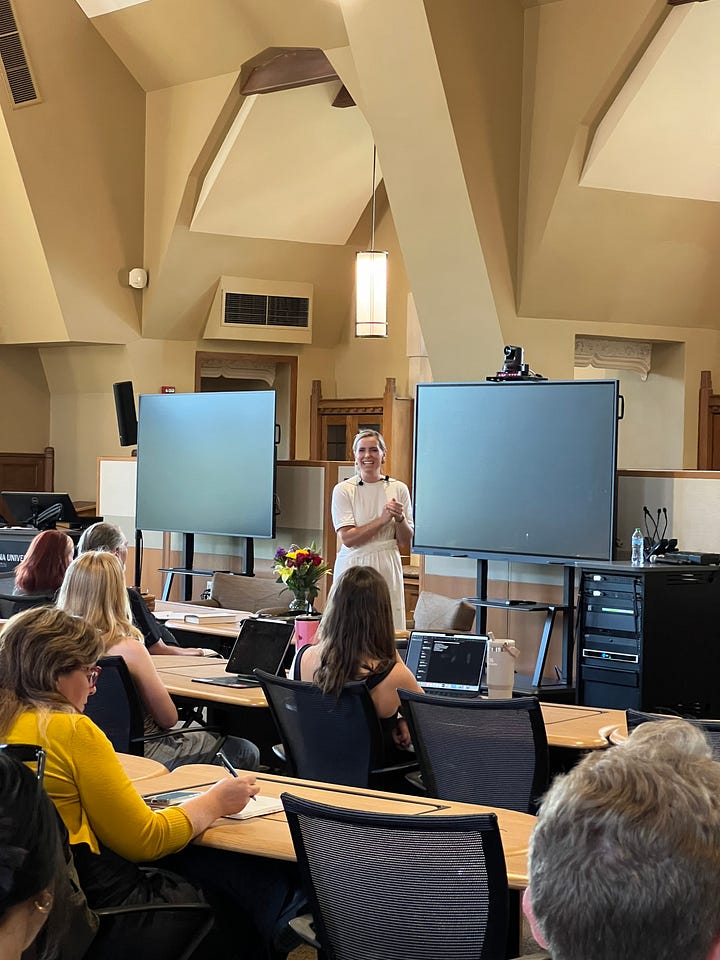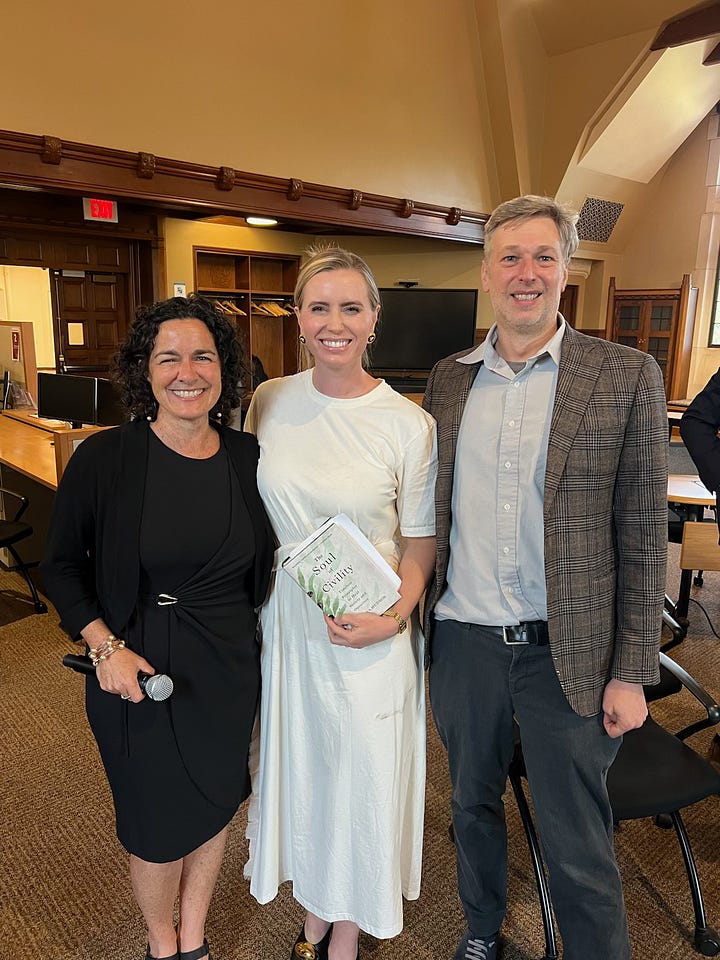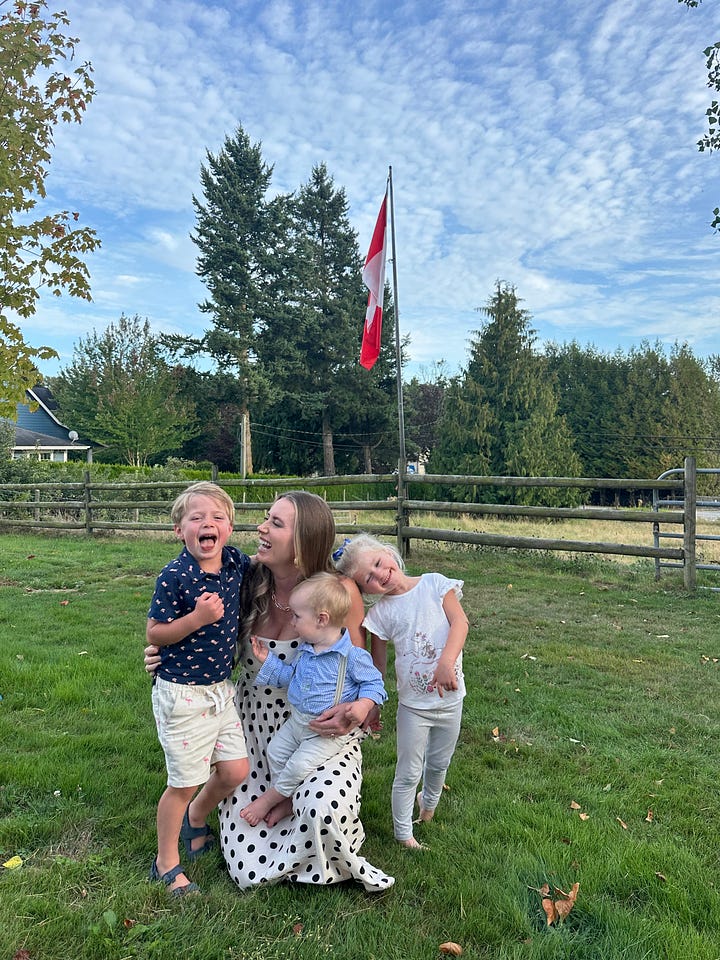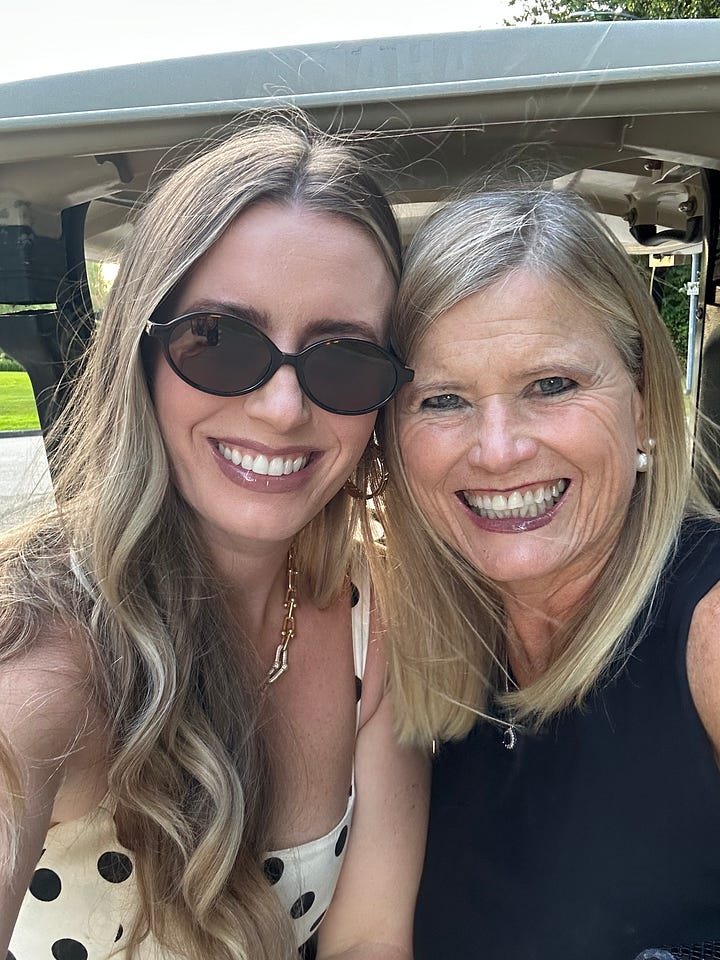Empathy Is Not Endorsement
Why Our Shared Humanity Must Come Before Ideology & An Important Invitation For Tomorrow—Be Sure To Read To The End.
This post is free, and I hope you enjoyed it. If you did, please consider supporting my work with a paid subscription. Your support helps bring beauty, goodness, and truth into our public discourse—something our broken world needs now more than ever.
Gracious reader,
I received a message after I expressed grief over Charlie Kirk’s death that said, in essence: unless I condemned his ideas as hateful, I had no right to grieve his murder. But that is precisely the logic of dehumanization that fuels our crisis. To mourn a man—a husband, a father to two young children, ages three and eighteen months, close to the same age as many of my own children—killed in cold blood is not to endorse his politics. Empathy is not a reward we give to those we agree with; it is the recognition of another’s humanity.
I did not know Charlie Kirk personally. I didn’t agree with him on many issues. But neither of those things is required to condemn what happened to him.
When the CEO of UnitedHealth was murdered in cold blood, we should grieve. When Minnesota House Speaker Melissa Hortman and her husband were killed in their home just three months ago, we should grieve. When Paul Pelosi was attacked in his home, when Ukrainian refugee Iryna Zarutska was stabbed to death on a subway in North Carolina— whenever there is a senseless loss of human life, we should all mourn.
If we allow our compassion to become contingent on ideology, then we have already surrendered to the same dehumanization that makes violence possible.
That conviction is why I wrote The Soul of Civility—to remind us that the gift of being human is always prior to politics, and that our common life depends on remembering it. My hope is that the book can serve as a resource for anyone trying to navigate moments like this with clarity and grace, helping us resist hatred without losing sight of the dignity of every person.
My work centers on recovering the gift of being human—in ourselves and in one another—even amid sharp disagreement. In recent days, several readers have shared how these ideas helped them navigate this moment; that is exactly what I hoped the book would serve. I wanted to share a few of these in hopes that their reflections could be an encouragement to you as well.
Indiana University Bloomington
From Mark Farley, head of Political and Civic Engagement Program at Indiana University Bloomington, where I spoke and enjoyed wonderfully rich and thoughtful dialogue with faculty and students the day before Charlie Kirk’s death:
“It was really lovely to have you at IU this week. After my class yesterday, three of my students who were at your talk were waiting for me to exit the classroom to help process the events at Utah on Wednesday. They said they really enjoyed your talk and appreciated the occasion to reflect on the inherent moral worth of all people, while still being diametrically opposed to someone else's conception of the world. They were processing all of this as they were also seeing reactions from their peers that were uncharitable and uncivil. I sat and talked with them for about 20 minutes after class about listening to people's pain and grief, while making every effort to lead with grace.
The senseless murder is deeply unnerving, especially for those of us who are involved in campus dialogues on controversial topics. But I think your presence the night before was really helpful for my students.”


California State Legislature
From Chris Walker, who spent the day distributing The Soul of Civility in one lesson poster (download here) to state legislator offices the day after Charlie was killed:
“Please know how appreciative these staff were of the message. It was a bit of a salve on the wound, so to speak, to help heal. So many are spinning from not just the event but the secondary hit of all the insane posts on social media. The folks I spoke with were touched by the visit.”
He continued,
“My thoughts today are surrounding the importance of the ‘humility’ to people being able to embrace civility. I loved you introducing me to the term “libido dominandi”. We must have humility and suspend the urge to dominate and “win” to be able to thoughtfully engage with one another.
I am hopeful that out of this moment of darkness might come a renewed appreciation for the sanctity of human life, regardless of political persuasion. One way to help make that hope a reality is to join us for a national conversation this Sunday evening. Alongside leaders from organizations such as Braver Angels and the National Constitution Center, I’ll be discussing this and other grievous violations of human dignity — and, more importantly, how we can do better from here. I warmly invite you to be part of this dialogue. Details and registration are below.
Warmly,
Lexi
You are invited!
The For the Good of the Public Summit gathers Christians and public service-minded leaders who want to think deeply and work practically for the health of our public life—leaders who believe Christianity offers essential contributions for the good of our neighbors, our institutions, and our shared future. This year’s summit will be held October 20–21, 2025, in Washington, D.C., featuring speakers like Gov. John Kasich, Freya India, Joshua DuBois, Richard Reeves, Jonathan Eig, Meghan Sullivan, and Justin Giboney.
In the news:
Would you be willing to recommend The Soul of Civility as a resource for navigating this divided time? The moment is urgent:
• Axios just highlighted Congress’s hunger for civility in the wake of escalating violence.
• Another Axios piece profiled the Civility Summit in Carmel as a national model.
• C-SPAN invited me on air at 4am this morning to discuss civility in American politics.
Each of these points to the same truth: the time is right, and the need is real.
Trinity Western University Alumni “Think Truthfully”Award
It was an honor to receive the 2025 Alumni “Think Truthfully” Award from Trinity Western University. The occasion was made even more meaningful by sharing it with my family—especially my mother, Judi, a fellow alumna, as well as my aunts, cousins, and brothers, all TWU alumni, and my father, a professor at the university. I remain profoundly grateful for my years at TWU, and for the guidance, knowledge, and friendships that continue to shape my life.


Year Ago on Civic Renaissance:
The Hidden Secrets of The Life Well Lived
Thank you for being part of our Civic Renaissance community!






Alexandra,
I picked up your book about civility. I'm pretty sure as an audible book and I really really really appreciate your angle on that topic. Also, I am committed to picking up an ember or a spark from Charlie Kirk's torch and I'm going to carry it forward and I was asking myself how am I gonna do this? I live in a midnight blue part of Washington state on an island where people routinely assume when they make nasty statements about how they wish the president was dead or how they're happy that Charlie Kirk was murdered. They say it with the full assumption that everyone in the range of hearing is in complete agreement with them. I also Personally know dozens and dozens of people who are good Americans, who are conservative and real Christians who absolutely walk on ice and keep their mouth shut and say nothing because the silence of being a bystander is the only thing that protects them from the vicious bullies in our community. So I decided that the spark I'm going to pick up is the concept of turning point, everything about what Charlie Kirk did is Lars what I do when I engaged with my community on social media. I'm one of the very few people in the Island who will actually speak up honestly and respectfully, and not be bothered by the haters,and I'm interested in talking to you about the idea of creating a turning point movement for people in their 40s and 50s on up.
I'm not buying this nonsense.
You had no empathy for Melissa Hortman or Gabby Giffords.
Your tears and empathy for Kirk are nothing but endorsement and an attempt to demonize the left for what was in fact a far-right wing shooting. The shooter was raised in a Republican, Christian home and was associated with Groypers.